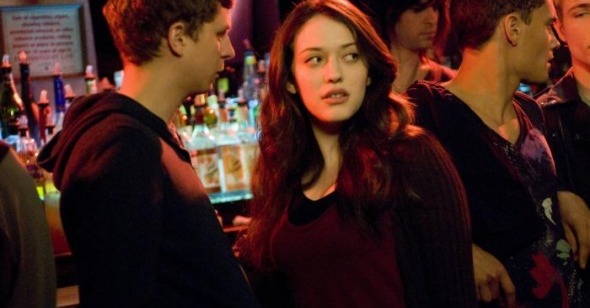iPod People
By Sarah Silver
Nick and Norah’s Infinite Playlist
Dir. Peter Sollett, U.S., Columbia Pictures
In this era of cookie-cutter quirk and engineered individuality, where Juno and Charlie Bartlett reign as prom queen and king, originality and rebellion are commodities manufactured, packaged, and sold to teens and other susceptible target markets. The term “indie” has had less and less to do with a DIY work ethic or lack of corporate funding, and though a handful of major studios have cut their “art house” divisions in the past year, the sensibility still remains. It’s a label that’s bandied about indiscriminately, often referring to certain aesthetics, or even specific actors.
Enter Nick and Norah’s Infinite Playlist, marketed by Sony Pictures Entertainment as an indie film thanks mainly to its cast (Juno’s Michael Cera and Bartlett’s Kat Dennings) and its soundtrack (Vampire Weekend, Devendra Banhart, etc.). Labels aside, the talent involved is intriguing: director Peter Sollett’s intimate feature debut, Raising Victor Vargas, brought forth disarmingly candid performances from its young cast. Under his deft direction, the heretofore one-note Cera and the mostly anonymous Dennings had the potential to shine. And, with the exception of its telltale Juno-style credits, Nick and Norah starts out well enough. Nick (Cera, gentle and bewildered, as usual) is stuck on his ex-girlfriend and is making her a series of mix CDs commemorating the end of their six-month relationship. When the object of his affections chucks them into the trash, these thoughtfully compiled aural love letters end up in the hands of Norah (Dennings). The premise is rife with opportunities to explore the poignancy of young love, the power of music, or simply the ups and downs of everyday teenage life.
Instead, we get gross-out gags (gum, extracted from a vomit-filled toilet, popped back into a mouth for chewing), unwarranted “Big Girl” sass (Norah, probably a size 6, says of Nick’s ex “I could floss with that girl!”), and genres of people replacing actual fleshed-out characters. Much like Paulie, Cera’s tracksuit-wearing, Tic Tac–addicted character in Juno, Nick marches to the beat of his own three token characteristics: he is the only straight member of a queercore band, he keeps Febreze in his car, and he drives (get this) a yellow Yugo. Unfortunately, association with a brand name does not equal instant backstory, and the thin veneer of personality painted on each character begins to crack and peel every time the possibility for genuine emotion presents itself.
The film takes place during one crazy night and follows two searches: one for the secret performance of a mysterious band called Where’s Fluffy, and the other for Norah’s drunk friend who is wandering the streets of New York. The dialogue isn’t as contrived as Juno’s, but there are enough halting moments and jokes falling flat to suggest something like Diablo Cody taking a stab at “mumblecore.” When discussing their respective suburban Jersey habitats, Nick offers, “Englewood, up to no good,” to which Norah counters, “Hoboken, no jokin’!” Though not exactly quips on par with Nick and Nora Charles of the Thin Man movies (to which no reference is made in this film), their lines are often recited nervously, lending them an authentic first-date feel.
Yet for a movie attempting realism, no shade of nuance is given to the characters: they are either all good or all bad. The filmmakers don’t trust the audience enough to work its way through the murky mire of complicated relationships. Instead, Nick and Norah’s respective exes are morons with paint-by-numbers motivations for wanting the titular characters back: Tris (Nick’s ex) thinks Nick’s cool-kid value is going up because he’s getting into clubs she can’t get into, and Tal (Norah’s on-again off-again) is using her to get a demo CD to her dad, a record-label mogul. It’s difficult to believe that Nick is a sensitive boy whose broken relationship has emotionally scarred him enough to pour his soul into multiple mixes, when the only reason offered us as to why he is so hung up on Tris is that he misses having sex with her. His sole fond memory is of her in a negligee, giving him a come hither look, and she nearly wins him back by performing a striptease in his headlights while he watches from the car.
In fact, sex is treated in such a cavalier manner here as to be downright offensive. After all, this isn’t an out-and-out depraved comedy like Porky’s or Meatballs, and the inconsistency of tone—realism interrupted by what feels like obligatory slapstick—fatally sabotages any latent sincerity. The main characters’ one-night speed date consists of approving indie rock cred based on the spin of an iPod dial (“We’re, like, musical soul mates!”) and determining that their exes are losers because they just aren’t indie enough. A night that realistically would have ended with a noncommittal declaration (“I’ll totally Facebook you!”) and the glimmer of prospective romance in the air ends instead with earth shattering sex, and Norah’s first orgasm—heard but not seen, as the meters and knobs in her father’s recording studio prove that this one is off the charts!
The effect of this superpoke, though, is just as impersonal as one on Facebook, and by the time we pan back to the postcoital couple, it would appear they achieved such bliss without removing a single article of clothing. A text on one of their cell phones immediately jolts them out of what, in a world of sentient human beings, might be considered afterglow: a friend has found the Where’s Fluffy performance—forget about all that mushy stuff—these kids have gotta get to the show!
Nick and Norah could only have been spawned in a world where band, movie, and book recommendations are no longer offered by friends but appear, unsolicited, in the sidebars of emails. It’s the kind of movie that makes me give honest-to-Blog thanks real life isn’t written by screenwriters.
